- Home
- Craig Alanson
Zero Hour (Expeditionary Force Book 5)
Zero Hour (Expeditionary Force Book 5) Read online
Expeditionary Force
Book5: Zero Hour
By Craig Alanson
Text copyright © 2017 Craig Alanson
All Rights Reserved
Contact the author at [email protected]
Cover Design By:
Alexandre Rito
[email protected]
Table of contents
Chapter One
Chapter Two
Chapter Three
Chapter Four
Chapter Five
Chapter Six
Chapter Seven
Chapter Eight
Chapter Nine
Chapter Ten
Chapter Eleven
Chapter Twelve
Chapter Thirteen
Chapter Fourteen
Chapter Fifteen
Chapter Sixteen
Chapter Seventeen
Chapter Eighteen
Chapter Nineteen
Chapter Twenty
Chapter Twenty One
Chapter Twenty Two
Chapter Twenty Three
Chapter Twenty Four
Chapter Twenty Five
Chapter Twenty Six
Chapter Twenty Seven
Chapter Twenty Eight
Chapter Twenty Nine
Chapter Thirty
Chapter Thirty One
Chapter Thirty Two
Chapter One
“Colonel Bishop, it has been fourteen hours,” Hans Chotek told me unhelpfully, while glancing meaningfully at his watch.
I wasn’t wearing a watch. The United States Army gave me a nice watch, which now mostly sat unused in a drawer in my cabin. I think it was in a drawer; that is where I put it, but I hadn’t seen it in a while. That drawer held some of my cold-weather gear, and since I hadn’t experienced cold weather in a while, that gear hadn’t gotten any usage since we left the planet Newark. Anyway, I didn’t need to wear a watch, the zPhone in my pocket told me the time. And I didn’t need a zPhone to tell me fourteen hours had passed since I sent Nagatha on a recon mission; the display on the far bulkhead of the galley had a counter in the top right-hand corner that now read 14:04:57. Then 14:04:58. Yes, thank you, I did not need any reminding that my big gamble was so far a complete failure. “Yes, Sir. The first time he went missing, Skippy was gone for more than seventeen hours,” I said with a combination of hopefulness and defensiveness. Really, I just wanted Count Chocula to go away right then; I had come into the galley for a cup of coffee, not a lecture. And truthfully, I did not need a fourth cup of coffee that day, I had walked to the galley merely because I had not much else to do. With the Flying Dutchman drifting slowly through empty interstellar space, there wasn’t much for me to do. Our science team, and some of our pilots who had backgrounds in engineering or physics, were working to keep the reactors functioning. My only job was to stay out of their way. To fill my time, I had been training to fly the larger type of Thuranin dropship, the one we called a ‘Condor’. And I had been writing letters to the families of the people we lost on Kobamik, when a one-in-a-million shot by a Golden BB shot down their dropship. It was likely that, if we ever got back to Earth, the families of our fallen would not see my letters, as they weren’t cleared to know the truth about the Merry Band of Pirates. They would be told their loved one had died in a ‘training accident’, and no details would be provided. I wrote the letters anyway; writing them helped me deal with my own grief and guilt. Thinking about the people I had gotten killed on an alien world, far from home, was my mental state when our micro-managing mission commander pointed out the time. Our civilian mission commander.
Chotek raised an eyebrow. To his credit, he raised the pitcher of cream for me to pour in my coffee. “Do you think that seventeen hours is significant somehow?”
Taking a sip of coffee gave me time to bite my tongue, avoiding the smart-ass remark I wanted to make. What I wanted to do was inquire, why the hell he was asking me about the internal workings of Elder AIs? A gulp of too-hot coffee gave me enough of a pause to save myself from embarrassment, and save myself from being a jerk. When I handed the pitcher back to Chotek, the look in his eyes was not the accusing irritation I had become all too familiar with since he came aboard. What I saw standing in front of me, in the galley of a disabled alien pirate ship forty seven hundred lightyears from Earth, was simply a frightened human being. In that regard, our mission commander was no different from any other person aboard the Flying Dutchman. He was scared, and he was looking to me for a sign of hope. Any sign of hope, no matter how slim. “Seventeen hours?” I pondered the question, mentally kicking myself. The first time Skippy had gone ‘on vacation’, he had come back to us in about seventeen hours. That was how long it took him to fight off the computer worm that had ambushed him, but I had never asked whether seventeen hours was a significant number, or totally random. Damn it, I should have asked him when I could. “I don’t know, Sir,” I admitted. In the military, I had learned that ‘I do not know’ is an acceptable answer, it was considered much better to be honest about your ignorance than trying to bullshit your way through a question. Saying ‘I do not know’ is supposed to be followed up with ‘I will find out’, which in this case, I couldn’t do. “The circumstances are different.”
“True,” he nodded, then he glanced at the counter again. “I’m sure you are busy, Colonel,” he raised his own coffee cup as a salute, and I responded with the same gesture. Part of the reason I went to the galley was for some company, idle chit-chat. Instead, with Hans Chotek there holding a full cup of coffee and a muffin like he planned to be there a while, I decided to go back to my office.
On the way back to my tiny closet of an office, I stopped by the bridge/CIC compartment, where absolutely nothing was happening. Two pilots, both Chinese, sat in their couches, talking quietly about something. The duty officer in the command chair was Captain Giraud of the French team, still not fully recovered from radiation poisoning on our last mission. He had nothing to report, and the CIC crew had absolutely nothing on sensors. With the nearest star almost two lightyears away, that was not surprising.
If we were faced with a threat, the duty officer in the command chair had two options. Order the pilots to perform a short emergency jump that Dr. Friedlander of our science team strongly recommended against attempting. Or, flip up the safety cover and press the button to set off the cluster of tactical nukes in a cargo bay. According to Friedlander, trying to use our wonky jump drive might be more dangerous than explosively compressing the plutonium cores of our nukes.
On that happy note, I went back to my office, where my iPad was mocking me by displaying the counter clock at 14:19:08. More than fourteen hours had passed since Nagatha went on the recon mission I had requested her to perform. At the time, we both had known what I asked her to do was extremely risky. Possibly risky to the Merry Band of Pirates, absolutely risky to her. Whether the submind Skippy had named ‘Nagatha Christie’ was truly sentient or not, I felt bad about asking her to do something that would not only very likely be fatal for her, but also very likely stupid and useless. Nagatha had told me not to worry about the risk to her, since if the Flying Dutchman remained trapped in interstellar space, we were all certain to die anyway, including her.
In my defense, I was desperate, grasping at straws. The ship was trapped in interstellar space, a dozen lightyears from the Lagoon nebula in the Sagittarius Arm of the galaxy. Where in the galaxy we were truly didn’t matter; what mattered was that we had no way to get to a habitable planet, and the ship was slowly dying around us. Dr. Friedlander had a brilliant idea to stretch out the life of our jump drive. It was a brilliant idea, we simply had not been a
ble to make it work. After our last jump nearly failed and the science team was plunged into utter despair, I became desperate. Desperate enough to try something, anything. So, I asked Nagatha to download her entire consciousness into Skippy’s beer can. My hope was that she would find the irascible asshole in there and wake him up. If she learned that Skippy had been relaxing on a couch, wearing fuzzy slippers and eating bonbons while watching trashy TV, I would be pissed at him. I would also be overjoyed at his return. If she couldn’t find Skippy in there, at least Nagatha might be able to give us a hint at Skippy’s fate. And, to tell the full truth, a tiny piece of me was hoping that, given the full resources inside Skippy’s tightly-packed beer can, Nagatha might be able to expand her consciousness enough to fix our jump drive. The worst thing that could happen was Nagatha could disappear, and we would never know what happened to her. Given that we were already facing certain death when our reactors failed, Nagatha disappearing wouldn’t significantly make our situation any worse.
She had disappeared. The nanosecond after she reported she was retracting her consciousness from the Dutchman’s inadequate computers, she went silent, and we hadn’t heard a peep from her since. Skippy’s beer can was still cold, with no change in status our sensors were able to detect. When we returned to the ship from our mission on Kobamik, at first I kept Skippy’s silver beer can in a recess on the bridge, but seeing his silent form was a constant depressing reminder to the duty crew. To avoid distracting people from their jobs, I next moved him to my office desk, then realized that was only me indulging in useless self-recrimination. So I had moved him to the science lab, where his inert beer can was surrounded by sensors.
I set the coffee mug on my desk without sitting down. The mug was painted with the logo I had designed, a pirate monkey surfing on a winged banana. ‘UN ExForce’ scrawled across the top, with ‘UNS Flying Dutchman’ on the bottom. Unless we could get the jump drive working again, maybe I should rename our ship ‘Drifting Dutchman’.
Or ‘Dying Dutchman’.
That would probably not be good for morale.
“Dr. Friedlander,” I addressed our friendly local rocket scientist when I walked into the science lab. His chair was to the right, which allowed me to avoid looking to the left where Skippy’s beer can was resting in a cradle on a workbench. “How is your team?” He looked as tired as I felt, even though we had all been getting more sleep than usual. Or, we had all been spending more time in our bunks whether we got more sleep or not. I know I was suffering from insomnia while laying uselessly in my bunk, mentally ticking off the days until our reactors inevitably shut down and left the ship to freeze in interstellar space.
“The team?” He shook his head, taking a moment to refocus his thoughts. “Fine. They’re fine,” he waved vaguely to the other workstations in the science lab, which was empty. “As you know, Colonel, most of my team is researching Reactor Two.”
I did know that. The science team, in Kristang armored spacesuits and accompanied by a SpecOps team to keep them out of trouble, were poking around in Reactor Two, which was shut down cold. That reactor had some residual radiation, of the type the armored suits could protect them against. What Friedlander hoped to gain by going into the damaged reactor was better insight into how the containment system and fuel feed systems worked. Ultimately, he hoped we could understand the mechanisms well enough to stretch out the useful life of Reactor Three. Number Three, even at minimum power, was expected to automatically shut itself down within a year, probably a lot sooner. “I know. Have you found anything useful?”
He unconsciously touched his forehead, which still had an impression from the helmet liner of the suit he had worn. “We don’t know yet. We need to analyze the data,” he pointed to the display in front of him. Friedlander had led the first team inside the reactor. “It’s, odd.” He looked at the display. “Skippy told me I had to give him a new joke every day, as a sort of payment for keeping the reactors functional. Since he went away, I’ve been writing down jokes I haven’t told him,” he shrugged. “It was a pain having to come up with new jokes; now I’d be happy to tell jokes all day, if that brought him back. The reactor, um, we did get a good look at the containment system; it is not what we expected.”
He went on for a bit about the exotic matter in the reactor’s containment system, while I struggled to keep my eyes from glazing over. “Doctor,” I interrupted him before I fell asleep. “I’m sorry, the reactors are important, but we have at least several months before they become inoperable. If we can get the ship close to a star, we can supplement our power supply with solar panels-”
“We don’t have enough solar panels currently. We are working on-”
“I know,” I said, letting a touch of sleep-deprived irritation creep into my voice and regretting it. “Let’s deal with one problem at a time. Can we use the jump drive again?”
He looked away, tapped a few keys on his laptop, then looked back toward me, avoiding my eyes. When he looked up, his expression told me what I needed to know. “I do not recommend it. Our last jump damaged the drive controller unit, and we don’t understand its functioning well enough to attempt a repair. The controller unit can be partially bypassed, however,” he took a deep breath. “I am concerned another jump would degrade the remaining coils to the point that,” he looked behind me to where Skippy’s dead beer can rested on a workbench, “even if Skippy comes back, the drive might be beyond his ability to repair. Colonel,” he looked me straight in the eye, “in any circumstance, I do not think the drive should be used for more than one more jump. One jump is not far enough to get us to a star system.”
“Then, there is no point taking the risk,” I agreed. Without faster than light capability, our remaining options dwindled to two, neither of them attractive. We could continue drifting in space while shipboard systems slowly failed one by one, in the hope that Skippy would magically awaken and save us. Or we could give up and detonate our nukes, saving us all from freezing or suffocating to death. We had salvaged a pair of derelict Kristang transport ships on our last mission, and it struck me suddenly that I had a glimpse of what the Kristang civilians on those ships had felt. They too, had been aboard ships that were incapable of jumping, and as their reactors failed, heat radiated away into space, and oxygen ceased to be recycled. With those ships grossly overloaded by Kristang civilians, oxygen had likely become a problem long before they felt cold. Unless we could change our situation, the Merry Band of Pirates faced the same fate as the Kristang aboard those derelict transports. Only we would have longer to think about it, before our reactors failed. I changed the subject slightly, because the discussion wasn’t going anywhere useful. “What about the lifeboat reactor?”
His expression brightened. “That might be more promising. It is a different design, not only different from our current reactors as modified by Skippy, but different from the original reactors installed by the Thuranin when that relay station was a starship. The relay station was intended to operate in a remote location for decades, and the station crew was not trained to perform more than simple, routine maintenance. Because the relay station reactors had to operate on their own for extended periods, they are a simple, rugged design. The lifeboat reactor does not generate anywhere near the output of our reactors, but it can go years before it needs heavy maintenance by a visiting service team. Unfortunately, that particular relay station is old, and the reactor was already due for major overhaul when we boarded the station.”
“Yeah, but it has been limping along at minimum power since we stole it, right?”
“That is correct,” Friedlander said in a voice that couldn’t help sounding like a professor lecturing a dimwitted student. “However, it sustained damage when we fought that Thuranin cruiser near the relay station, and the reactor automatically shut down then. It wasn’t designed to be restarted without major maintenance; Skippy did what he could with his bots but the lifeboat’s reactor lost significant capacity.” He shook his head. “We could
get six, maybe seven months out of it? That’s a guess.”
“And you don’t like making guesses.”
“I’m an engineer,” he explained without apology. “I need hard data.”
I left that depressing conversation, intending to hit the gym for a run on a treadmill. While I hated pounding out miles on a treadmill, I always felt better after. Right then, I wasn’t feeling it; I changed clothes and went to the gym anyway, but all the treadmills were occupied. Even our hardcore SpecOps people were feeling down by our situation, they weren’t running or lifting weights with anywhere near the intensity they typically displayed. What was the point of keeping yourself in peak physical condition, if all we could do was drift through empty space in a slowly dying ship? Damn, that thought really depressed me, so I turned around, and almost collided with Sergeant Adams. “Leaving already, Sir?” She asked as she cocked her head at me.
“I’m, uh, not feeling it today, Adams.”
She cocked her head again. I knew that look. A lot of sergeants had given me that look during my military career. Adams was Marine Corps, not Army, but sergeants are sergeants. Damn it, I was a sergeant, in my permanent Army rank. Not that technicalities like rank meant anything, thousands of lightyears from Earth. Lowering her voice, she said “A lot of people aren’t feeling it, Sir. Seeing our commander walking around with that sad puppy dog look on your face isn’t helping.”
That straightened me up. “I heard that, Sergeant,” and I turned to see one of the rowing machines was available. “Tell me, what’s your secret to maintaining a positive attitude?”
“Not needing to.” She explained simply.
“Uh, what?”
“I still have a job to do, Colonel. I am going to do that job, whether it sucks or not, until the last lightbulb on this ship goes out. I don’t know what the Army is like, Sir,” there was that cocked head again, “but the Marine Corps doesn’t much care whether you’re having a good morale day or not. You do your job, regardless. Semper fidelis. Not when-I’m-feeling-it fidelis.”

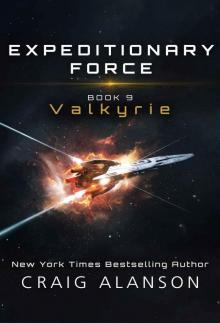 Valkyrie (Expeditionary Force Book 9)
Valkyrie (Expeditionary Force Book 9)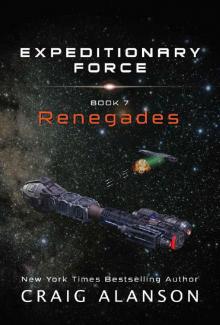 Renegades (Expeditionary Force Book 7)
Renegades (Expeditionary Force Book 7)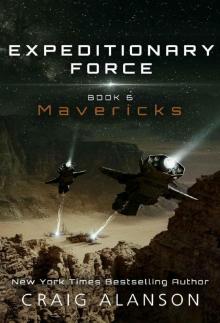 Mavericks (Expeditionary Force Book 6)
Mavericks (Expeditionary Force Book 6)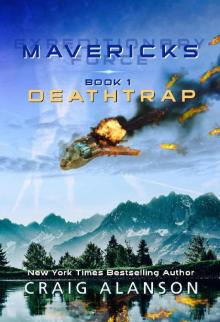 Deathtrap
Deathtrap Armageddon
Armageddon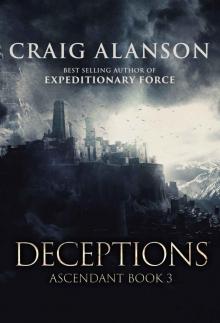 Deceptions (Ascendant Book 3)
Deceptions (Ascendant Book 3)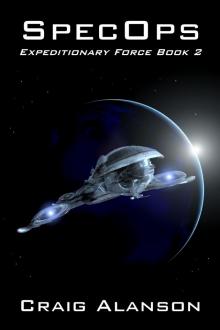 SpecOps (Expeditionary Force Book 2)
SpecOps (Expeditionary Force Book 2)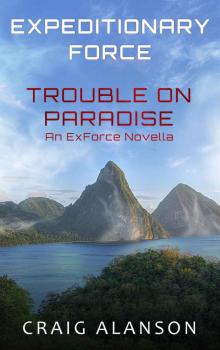 Trouble on Paradise: an ExForce novella (ExForce novellas Book 1)
Trouble on Paradise: an ExForce novella (ExForce novellas Book 1) Transcendent (Ascendant Book 2)
Transcendent (Ascendant Book 2) Columbus Day (Expeditionary Force Book 1)
Columbus Day (Expeditionary Force Book 1)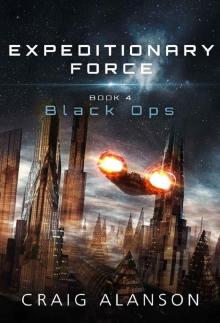 Black Ops (Expeditionary Force Book 4)
Black Ops (Expeditionary Force Book 4)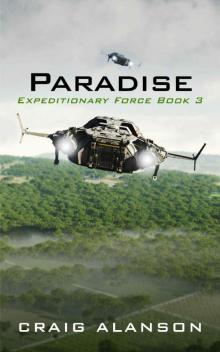 Paradise (Expeditionary Force Book 3)
Paradise (Expeditionary Force Book 3) Ascendant
Ascendant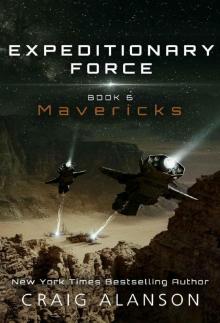 Mavericks
Mavericks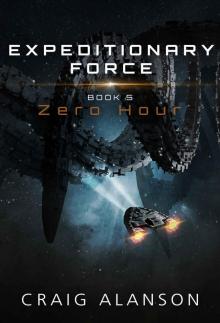 Zero Hour (Expeditionary Force Book 5)
Zero Hour (Expeditionary Force Book 5)